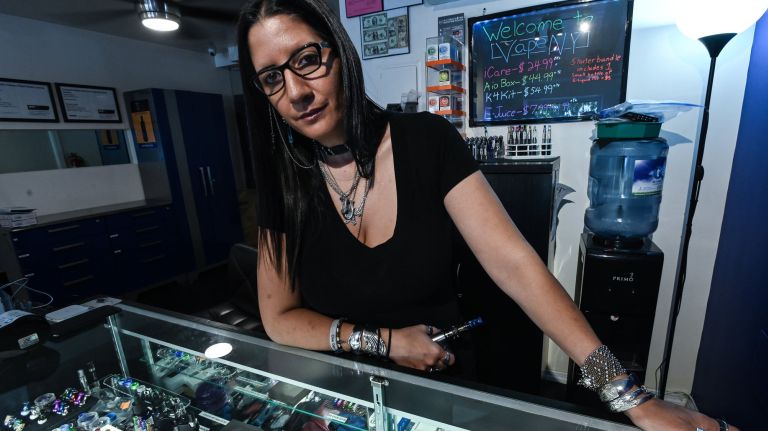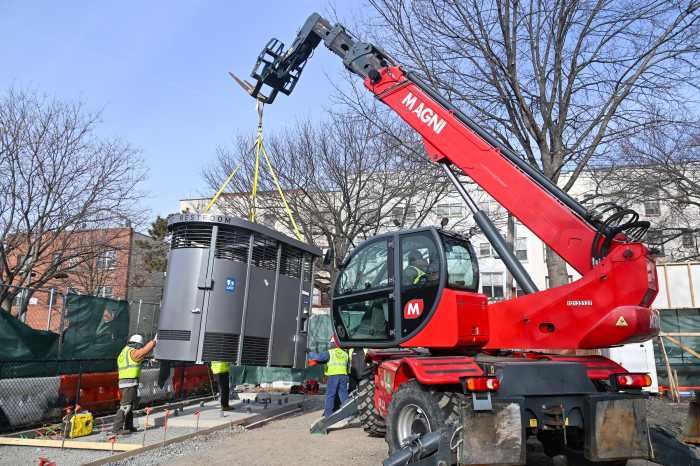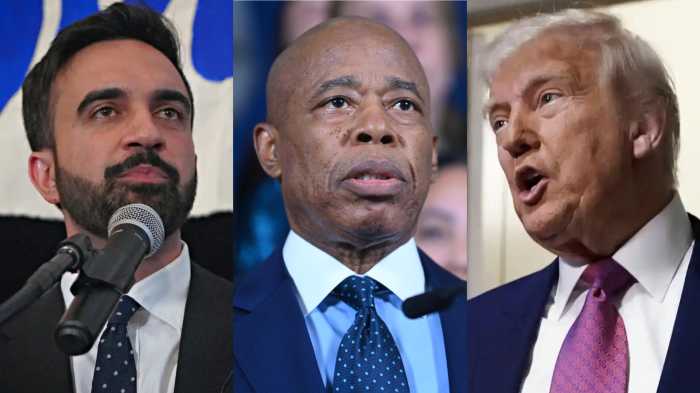
Vape shop owners across New York are reeling from a state ban on most flavored products, but they’re not going down without a fight.
The New York State Vapor Association is expected to file a lawsuit in the coming days that aims to reverse the ban, according to Spike Babaian, who owns several Vape New York shops in the city and is among those leading the charge against the state’s emergency regulation.
“Every [vape] business in New York would close within 30 days if they couldn’t sell 90 percent of what they sell,” Babaian said, adding that the lawsuit will seek to keep flavors on the market so they are accessible for adults looking for an alternative to smoking. “We don’t want anybody to go back to smoking because they can’t access the product they use to keep them off cigarettes.”
Those involved with the legal challenge hope to convince a judge to issue a temporary injunction on the ban while the lawsuit progresses. Otherwise, industry advocates fear hundreds of businesses will be forced to close.
Babaian said she recently had to make the tough decision not to renew the lease on her first Vape New York shop, located at 40 Rivington St. in Manhattan. “I would have liked to keep the first vape shop I’ve ever opened in Manhattan open, but unfortunately with [the flavor ban], I’m not certain that I can pay out a five-year lease,” she said.
When asked last week about a possible legal challenge to the state’s 90-day emergency ban, approved by the Public Health and Health Planning Council on Sept. 17, a spokesman for Gov. Andrew Cuomo’s office said they were confident the regulation would hold up in court.
State and federal governments take aim at vaping industry

Cuomo has been adamant that a ban on all flavors except menthol and tobacco is necessary to curb a spike in vaping among high school students, which rose from 10.5% in 2014 to 27% in 2018, according to the state Health Department. In an op-ed published in the New York Daily News on Tuesday, Cuomo doubled down on his commitment to reducing youth vaping, calling it a “crisis” that his administration is tackling with a multipronged approach.
“Congress banned the sale of cigarettes with flavors, except menthol and tobacco, because they knew flavors were being used to hook children. Since then, Americans — especially children — have made remarkable strides in shedding this lethal habit,” the governor wrote. “It would be a tragedy if we defeated one menace only to allow another to take its place. But that’s exactly what we’re letting the e-cigarette and vaping industry do.”
New York was the first state to ban the sale of flavored e-cigarettes and vaping products, followed a day later by Michigan. Massachusetts on Tuesday instituted a broader temporary ban on the sale of all vaping products in the state.
At the federal level, the Food and Drug Administration is preparing to unveil premarket requirements for vape and e-cigarette companies in an attempt to get rid of all flavors except tobacco.
Amid the mounting scrutiny of fruit- and candy-flavored products, the popular e-cigarette company JUUL Labs announced Wednesday that co-owner Kevin Burns was stepping down from his role as CEO. K.C. Crosthwaite, a former president and CEO of Philip Morris who has worked in the tobacco industry for decades, will replace Burns immediately.
The company also announced it was suspending all advertising of its products in the United States and would support and comply with the FDA’s new premarket requirements.
Misinformation swirls around THC vs. nicotine vaping
Compounding the issue, the FDA and U.S. Centers for Disease Control and Prevention have been investigating a deadly outbreak of severe lung illnesses believed to be linked to vaping. As of Sept. 19, the CDC has documented seven deaths and identified more than 500 possible cases nationwide.
A majority of the confirmed cases, however, involve patients who reported the use of vaping products containing THC, the psychoactive ingredient in marijuana, or other cannabinoids. Some of the patients said they inhaled both THC and e-cigarette products and even less reported only vaping nicotine products, according to the CDC.
The specific cause of the lung illnesses remains under investigation, and so far the CDC and FDA have been unable to link a specific brand, product, device, liquid, ingredient, refill pod or cartridge to all of the cases.
New York’s Health Department is investigating at least 93 possible cases, 21 of which are in New York City. Initially, all of the products submitted for testing by patients contained THC and high levels of vitamin E acetate, but as the number of cases continued to climb health officials said a definitive cause has not yet been confirmed.
Although most of the cases appear to involve black market THC cartridges and the root cause remains unclear, many politicians and officials have seized on the outbreak as another reason to reign in the nicotine vaping industry. Nicotine-based vaping advocates argue that grouping their products together with the THC-based cases spreads misinformation.
“What you’re seeing is craven politicians playing politics with public health. We’ve known for several weeks that the evidence was overwhelmingly pointing to contaminated THC cartridges sold on the street by drug dealers, not store-bought nicotine vaping products,” said Gregory Conley, president of the American Vaping Association, a nonprofit that advocates for sensible regulation of vaping products. “Removing flavors from the market does nothing to stop little Jimmy on Long Island from buying a possibly contaminated THC cartridge from a drug dealer.”
‘Prohibition has never worked in this country’
The THC cartridges linked to the outbreak also shows prohibition is ineffective, and leads to illicit markets filled with dangerous products, Conley said.
“New York is not an island and they’re not going to be able to prevent youth nor adults from utilizing the illicit market just like you can’t stop youth and adults from utilizing illicit markets for marijuana,” he added. “Prohibition has never worked in this country.”
New York’s flavor ban also provides several loopholes that consumers could exploit. The ban specifically targets manufacturers, distributors and retailers selling flavored e-cigarette and e-liquids, but does nothing to prohibit a consumer from buying the products across state lines or online from a company not based in New York.
In an effort to close this loophole, Cuomo announced on Wednesday his administration would be holding a summit with Connecticut officials to draft joint guidelines, policies and regulations regarding vape products.
Conley said consumers are also likely to turn to do-it-yourself kits, and some vape shops are already getting creative with their merchandise in an effort to stay in business.
“For example, there are unflavored e-liquids that can be sold containing nicotine. And if a consumer also purchases flavoring — at the store or online — they can add it themselves. That is the choice of the consumer,” he said.
However, do-it-yourself flavoring comes with its own risks. If a consumer doesn’t do the proper research and purchases an oil-based flavoring product, they could end up with “liquid pneumonia,” Conley warned.
“For people who don’t know, they pick the first blueberry flavoring they see and that ignorance can lead to someone inhaling oil into their lungs,” he added. “That’s the main illness caused by the contaminated THC oil cartridges in New York and across the U.S. You inhale oil into your lungs and it coats your lungs.”
Sales restrictions are preferred
Instead of a ban on flavors, the American Vaping Association supports a variety of methods that it believes could still reduce the number of youth who use the products, including restrictions on marketing and flavor names as well as Tobacco 21, a nationwide effort to raise the legal age to buy nicotine products to 21.
New York lawmakers passed legislation this year to raise the age to buy vape products from 18 to 21. That measure goes into effect on Nov. 13. The state also instituted a 20% tax on the sale of vape products, but there is no current registration or licensing system for vape retailers until that goes into effect.
“So there are shops that unless the FDA checks them to determine if they sell to a minor, there are no checks going on,” Conley said, adding that even temporarily restricting the sale of flavored products to adult-only shops would likely help curb youth vaping.
Restricting flavors to 21-and-older vape shops would also cut down the number of youth access checks the state would have to conduct by the thousands.
“Compared to prohibition, any of those measures that are restrictions rather than bans, are preferable,” Conley said.






































